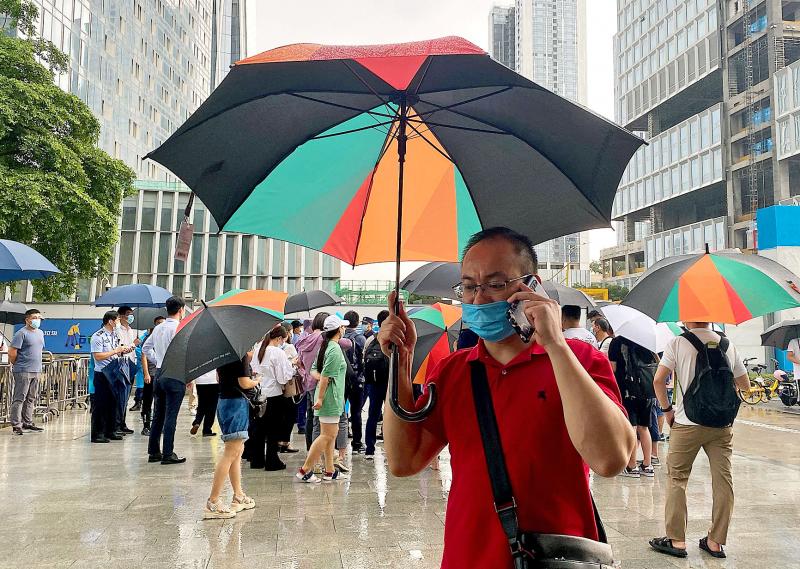Dozens of people yesterday protested outside the headquarters of Chinese property giant Evergrande Group (恆大集團) after the debt-laden firm said that it was under “tremendous pressure” and might not be able to meet its repayments.
The Hong Kong-listed developer is sinking under a mountain of liabilities totaling more than US$300 billion after years of borrowing to fund rapid growth.
The group was downgraded by two credit rating agencies last week, while its shares tumbled below their 2009 listing price, with a barrage of bad headlines and speculation of its imminent collapse on Chinese social media.

Photo: AFP
An estimated 60 to 70 people gathered outside Evergrande’s headquarters in Shenzhen, China, jostling with police and demanding answers.
Some were contractors owed money, others anxious investors, reporters at the scene said.
“Our boss is owed over 20 million yuan [US$3.1 million] and many people here are owed even more,” a man who gave his surname only as Chen (陳) told reporters. “We are definitely very anxious. There’s no clear explanation right now ... they should have paid the money when it was due.”
Evergrande’s plight has raised fears of a contagion across the debt-mired Chinese property sector — which accounts for more than one-quarter of the world’s second-largest economy — with a knock-on effect on banks and investors.
On Monday, the company said that it would avoid bankruptcy.
However, it issued another statement yesterday to the Hong Kong stock exchange, saying it had hired financial advisers to explore “all feasible solutions” to ease its cash crunch.
The statement warned that there was no guarantee Evergrande would meet its financial obligations.
The firm blamed “ongoing negative media reports” for damaging sales in the pivotal September period, “resulting in the continuous deterioration of cash collection by the group, which would in turn place tremendous pressure on ... cashflow and liquidity.”
Shares in the firm fell more than 11 percent yesterday and are down almost 80 percent since the start of the year.
The company has about 1.4 million properties that it has committed to complete — about 1.3 trillion yuan in pre-sale liabilities as of the end of June — an estimate by Capital Economics said.
“Evergrande’s collapse would be the biggest test that China’s financial system has faced in years,” Capital Economics lead Asia economist Mark Williams said.
Yet “markets don’t seem concerned about the potential for financial contagion at the moment,” Williams said, adding “that would change in the event of large-scale default,” which would likely prod the People’s Bank of China to step in and buttress the teetering developer.
“The most likely endgame is now a managed restructuring in which other developers take over Evergrande’s uncompleted projects in exchange for a share of its land bank,” he said.
The pictures of angry investors outside the firm’s headquarters could also cause alarm in Beijing, where leaders are keen to keep a lid on social unrest.
Some creditors have demanded immediate payback of loans, Bloomberg News reported earlier this month.
Evergrande has already sold stakes in some of its wide range of assets and offered steep discounts to offload apartments, but still reported a 29 percent slide in profit for the first half of the year. It is also struggling to sell its Hong Kong headquarters, even at a loss.

KEEPING UP: The acquisition of a cleanroom in Taiwan would enable Micron to increase production in a market where demand continues to outpace supply, a Micron official said Micron Technology Inc has signed a letter of intent to buy a fabrication site in Taiwan from Powerchip Semiconductor Manufacturing Corp (力積電) for US$1.8 billion to expand its production of memory chips. Micron would take control of the P5 site in Miaoli County’s Tongluo Township (銅鑼) and plans to ramp up DRAM production in phases after the transaction closes in the second quarter, the company said in a statement on Saturday. The acquisition includes an existing 12 inch fab cleanroom of 27,871m2 and would further position Micron to address growing global demand for memory solutions, the company said. Micron expects the transaction to

Vincent Wei led fellow Singaporean farmers around an empty Malaysian plot, laying out plans for a greenhouse and rows of leafy vegetables. What he pitched was not just space for crops, but a lifeline for growers struggling to make ends meet in a city-state with high prices and little vacant land. The future agriculture hub is part of a joint special economic zone launched last year by the two neighbors, expected to cost US$123 million and produce 10,000 tonnes of fresh produce annually. It is attracting Singaporean farmers with promises of cheaper land, labor and energy just over the border.

US actor Matthew McConaughey has filed recordings of his image and voice with US patent authorities to protect them from unauthorized usage by artificial intelligence (AI) platforms, a representative said earlier this week. Several video clips and audio recordings were registered by the commercial arm of the Just Keep Livin’ Foundation, a non-profit created by the Oscar-winning actor and his wife, Camila, according to the US Patent and Trademark Office database. Many artists are increasingly concerned about the uncontrolled use of their image via generative AI since the rollout of ChatGPT and other AI-powered tools. Several US states have adopted

A proposed billionaires’ tax in California has ignited a political uproar in Silicon Valley, with tech titans threatening to leave the state while California Governor Gavin Newsom of the Democratic Party maneuvers to defeat a levy that he fears would lead to an exodus of wealth. A technology mecca, California has more billionaires than any other US state — a few hundred, by some estimates. About half its personal income tax revenue, a financial backbone in the nearly US$350 billion budget, comes from the top 1 percent of earners. A large healthcare union is attempting to place a proposal before